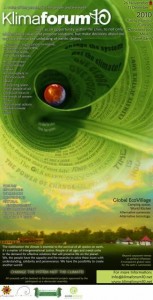-by Graham Reeder
Yesterday I spent the day at Klimaforum, an alternate forum the the UNFCCC negotiation pioneered by grassroots organisations that “rises as an opportunity within the crisis, to not only address the related issues and propose solutions, but make decisions about our involvement in the unfolding of earths destiny.” Klimaforum aims to bring different actors in civil society that are unheard or underrepresented at the official UN negotiations together in order to voice united concerns with the current system of climate governance. Unfortunately, on this warm Thursday which also happened to be the Young and Future Generations Day, I only saw about 200 people pass through the area, many of whom were volunteers who were camping there. Last year Klimaforum was a much more organised event held in a convention center that drew speakers like Naomi Klein, Elizabeth May, and even some heads of state. This past week however, it has largely served as a refuge for those who have not received accreditation, either due to strict accreditation procedures or computer glitches.
One reason for the underwhelming atmosphere at Klimaforum might be its location. The organisers initially wanted to hold the forum in downtown Cancun where many NGOs and Civil Society representatives are staying, but the Mexican government quickly shut that idea down. As a result, Klimaforum is being held at a polo club in the middle of a jungle with only small shuttle vans running to and from a couple of focal points that don’t match up with official transportation to the UN conference. This isn’t exactly the best system for mass numbers of participants.
Another issue that Klimaforum might be facing is the fact that so far the negotiations themselves are fairly low-profile. Ministers and heads of state are not scheduled to arrive until this weekend, and very few big names in the NGO world have come down to Cancun show their faces. Having said that, I think the main reason is that the forum itself is a complete organisational disaster. Not a single one of the sessions I attended started even remotely on time, technical difficulties were rampant, and there was no clear idea of who exactly was in charge. Volunteers seemed mostly to be there to enjoy the sunshine and reggae—not too interested in helping out but very happy to meet you and find out where you were from.
All hope is not lost for Klimaforum though; La Via Campesina, the world peasant organisation that helps organise the forum is doing mass mobilisation all over Latin America and has caravans arriving tomorrow and will be organising events throughout next week. Next week will hopefully see some actions from them in presenting the Cochabamba Accord, which was written at the World People’s Conference on Climate Change and the Rights of Mother Earth this April, organised by Bolivia’s President Evo Morales.
Only time will tell what happens to Klimaforum, a very young movement within Climate Change negotiations. Here’s hoping that they can get their act together and show both negotiators and media that ‘the people’ don’t believe it when neocons like Walter Russell Mead say that Climate Change is dead.



